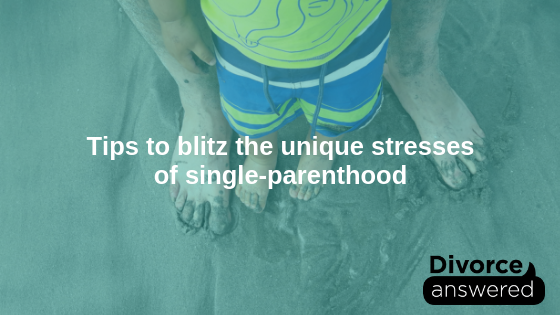Tips to blitz the stresses of single-parenthood

Becoming a single parent can be extremely stressful, at times. Firstly, the relationship ends which creates a period of uncertainty and overwhelm. Then, trying to find ‘new norm’ for yourself and your family is unchartered territory and rather unfamiliar waters. Knowing what to do and where to go goes a long way to alleviate some of the stress accompanied with being a single parent.
Rachael Scharrer, divorce expert, Separation Strategist and founder of www.DivorceAnswered.com.au, understands first-hand the stresses that come with becoming a single parent and finding simple methods or techniques to make each day a little easier and a little less stressful. Try some of the following tips to reduce your stress and to stress less:
- Co-parenting is a learned behaviour. Presents new challenges between the separating individuals. Try to come together as the parents of your child to agree upon some guidelines, responsibilities and arrangements. Perhaps you can agree upon how to best communicate with each other – will you call, SMS or email? How will you handle any areas that you disagree upon for parenting your child? Is there a mediator or family therapist that could help you find some common ground? Most importantly, agree to make your child and their needs the priority
- Don’t sweat the small stuff. Choose not to react when provoked. Unless there is a safety issue, don’t worry about things that are not in your realm of control. Let go of what isn’t useful to you.
- Embrace alternative therapies to help change and manage moods. Music and aromatherapy have been critical for people with illnesses and disorders to shift moods and attitudes. Scents like lavender, drinking chamomile tea and embracing soothing music can help to calm a household. If you are in the dumps, try having orange scent in a diffuser to invigorate, play some upbeat music to help energise the occupants of the house
- Download “Everyday mindfulness and gratitude during divorce.” This free e-book by Divorce Answered features seven practical suggestions you can implement every day at different moments to bring your attention back to you a centred place
- Breathe and meditate. Focusing on your breath and quietening your mind helps you to stay centred, focus on you and what your body is telling you. Regulating your breath regularly throughout the day has many benefits – it can set the tone of the day, reduce stress and anxiety levels and create calm for rest
- Exercise. Exercise offers happy endorphins – if you are unable to find the time to exercise alone or if you can’t afford to, try to do it as a family. This can be lots of fun and children will learn a positive behaviour for their own health and wellbeing. Alternatively, call on a friend to exercise with you – having a friend makes you more accountable for turning up and trying hard
- Ask for help. Don’t be afraid to ask for help, especially when you are experiencing overwhelm and overload. You might lean on neighbours, friends, family or professionals like your doctor, lawyer, psychologist, coach
- Balance structure and routine with going with the flow. Children thrive on structure and tend to thrive with clear boundaries and limitations. For instance, it may help to create a family chore chart or family routine that everyone can see and adhere to. However, we can’t be ruled by routine and at times we have to just go with the flow – let the house get messy, let the children sleep a little later, make sure that you are present and enjoying the company of your little family. Structure extends beyond the daily routine and into how you share the child between the parents. Creating a Parenting Plan is a great way to ensure that both parents have structure and routine to their weeks and months. You can access the Divorce Answered Parenting Plan for a fraction of the cost of a lawyer creating one (visit www.divorceanswered.com.au/parenting-plan/)
- Prioritise sleep. When we are all well rested and have had sufficient sleep, we all perform at a higher standard, are better able to regular emotions and reactions. However, when we are operating on a lack of sleep, we tend to have a shorter fuse and not make as considered decisions. Children also need sleep to help regulate their behaviours and emotions and to help with their ability to concentrate
There is a limited amount of stress that the body (specifically your nervous system) can tolerate over a select period of time. Your ability to manage your stress levels and minimise effects that the external influences may have on you will go a long way to creating a more positive overall wellbeing and quality of life.
Related articles:
How to help your adult child through divorce.
Simple self-care tips: /blog/simple-self-care-tips/
4 lessons about raising a child as a working parent.
Sleep hygiene
Disclaimer
This is general advice only and is not provided as legal advice. If you have a legal issue, you should contact a lawyer and/or accountant before making a decision about what to do or applying to the Court. DivorceAnswered.com.au cannot provide legal advice. If you have an emergency situation, please contact Emergency '000'. © Divorce Pty Ltd
